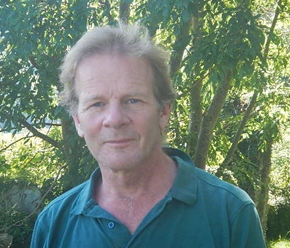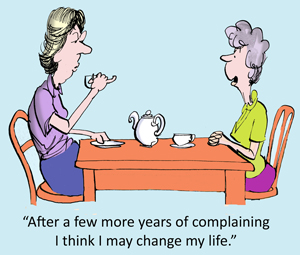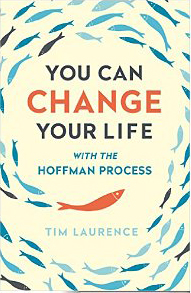 You Can Still Change Your Life
You Can Still Change Your Life
Hoffman UK founder Tim Laurence first wrote You Can Change Your Life in 2003. Here he explains why the newly revised book about the Hoffman Process is even more relevant now than it was ten years ago.
What do you hope that people will gain from reading ‘You Can Change Your Life’?
I hope it gives people three things:
- A greater awareness of their lives and the impact they have on the world
- A set of practical tools to recharge or discharge energy
- A nourishing reminder that change is not only possible but very worthwhile
People have often told me that the book removes the filters through which they see the world. They suddenly realize that patterns such as withholding emotions or giving up too easily might be normal to them and their family but aren’t helpful. They begin to get choice back and things like healthier relationships open up for them.
‘You Can Change Your Life’ was first published in 2003. Would you say that it’s still as relevant now as it was then?
The book is a guide to greater awareness of what helps and what hinders us. It’s meant to help us understand ourselves and those around us not only more clearly but also with more compassion. It’s also full of practical tips on areas such as bringing more peace into your life or having a better relationship towards your body or your finances.
So yes, I really trust that those values are still as relevant today as a decade ago.
What’s different from ten years ago is that we’re faced with even more challenges than before in a culture that offers little time to tap into what lies beneath our busy lives.
That’s the bad news. The good news is that to every force there’s an equal and opposite reaction. These days far more people are cultivating an inner life. Whether it’s through meditation, yoga, dancing, counselling or long, quiet walks, there’s a hunger now for getting back to what we deserve: self-fulfilment and peace of mind.
Have you noticed a difference in the people who come to the Process since 2003?
The main difference is that the Process is better known now, so it attracts a wider range of people. It’s even become kind of normal to do! But whoever comes, the same themes tend to be there. People are fed up and want to change. They could be driven by a relationship breakdown, a career gap, or simply by waking up thinking: ‘Is this it?’
 The book is split into two sections: how to change yourself and how to change your life. Do you think that changing ourselves is something we can all do, or are those who say ‘that’s just how I am’ actually right?
The book is split into two sections: how to change yourself and how to change your life. Do you think that changing ourselves is something we can all do, or are those who say ‘that’s just how I am’ actually right?
I think those who say ‘that’s just how I am’ are justified if they’re talking about something genetic, that’s more hard-wired like being a great runner or being very musical. However our charming or maddening personality really is flexible, as our brains are constantly rewiring and forming new habits. So even the belief about change could be a changeable one!
Is it possible to change your life without changing yourself first?
Well, let’s imagine you do change your life first. You decide to move to a beautiful island like Ibiza. You might wake up to a lovely view bathed in sunshine…. and you feel just as miserable as before. It even has a name, changing the outside – ‘doing a geographical’.
You need to change yourself first – only after that will real changes happen in your life. If you’re happy inside, you’ll find happiness around you. In exactly the same way, misery, as the saying goes, loves company.
Do you see any increase in particular behavioural problems since you first wrote the book? For example there’s a chapter on compulsive patterns. Do more people come on the Process with addictions to technology or do they find technology affecting their relationships?
Undoubtedly. I mean, when we brought Hoffman here in 1995, only 1% of the population had Internet access. It’s now 90%. The result is even more of a chattering mind and less ability to concentrate. You have your phone at the dinner table; you’re not fully there. You sleep with it close by; you don’t fully rest. So yes, more relationship and behavioural problems result.
 In the Process we see people seemingly reluctant to give up technology. Then after a few days they’re hugely relieved to notice how very differently they feel without the need to keep checking what’s going on beyond them. They’re more present to themselves and to their immediate environment.
In the Process we see people seemingly reluctant to give up technology. Then after a few days they’re hugely relieved to notice how very differently they feel without the need to keep checking what’s going on beyond them. They’re more present to themselves and to their immediate environment.
Other types of compulsive behaviour such as perfectionism and constantly worrying are still around in the same proportions. It all comes down to the same basic yearning; wanting to be loved, to feel safe and protected and to avoid the pain if that feeling of safety has been lost.
The book mentions working on four aspects of yourself: physical, emotional, intellectual and spiritual. Do you find any one of these is of more benefit than the others?
The part that’s of more benefit to a particular person is the part they’ve ignored the most. If you’ve been cut off from your feelings, connecting with the soft emotional heart will significantly change your relationships. If you’ve been flooded by your emotions such as anger or grief, you may need to actually move away from feelings and find a greater sense of safety by accessing your more cerebral side. That could translate as being much more effective and in control of your life.
Other examples – there are jaded cynics who have no sense of spirituality as well as those who’ve had a spiritual bypass to cope with worldly demands. It’s about balance, finding a middle way. As for the body, with the exception perhaps of personal trainers and yoga teachers, I reckon we could all benefit from paying more attention to our physical selves.
Speaking of paying attention – mindfulness is very popular now. It’s said to lower stress and increase fulfillment. Does Hoffman draw on similar principles?
It certainly does; for example we teach people to be in the moment and be aware of what’s going on, just as Mindfulness does. Right away on the Process you learn the value of scanning for what you’re feeling – thinking – sensing – and intuiting. Those who’ve done Hoffman know this as the Quad Check: being mindfully aware of the four parts of your being.
There are lots of interactive exercises in the book. Does reading it spoil the surprise if someone is considering doing the Process – or would it actually help them decide if it’s for them?
I don’t think words by themselves could ever completely convey the depth of the actual Hoffman experience. The exercises are there to get things going. If someone then wants to do the Process, they’ll be better prepared. If they’ve already done the Process, it’s an accessible reminder of the exercises and principles that they’ve learned.
 Finally, we’re coming up to a season of family gatherings when we’re urged to find goodwill towards our fellow man. Do you have any suggestions how we can do that at what can often be a very stressful time of year?
Finally, we’re coming up to a season of family gatherings when we’re urged to find goodwill towards our fellow man. Do you have any suggestions how we can do that at what can often be a very stressful time of year?
My prescription is: ‘Communication with liberal doses of patience’. Remember that your family may still see you in a certain role. If you don’t act that way, they’re confused. Keep talking, and if it’s appropriate, let people know what’s going on with you on a deeper level. It may even open the floor up to others and get a real conversation going, rather than just a safe but superficial one
To order the revised version of You Can Change Life visit our book page
Interview by Nikki Wyatt





 Sign up to receive monthly newsletters from Hoffman
Sign up to receive monthly newsletters from Hoffman